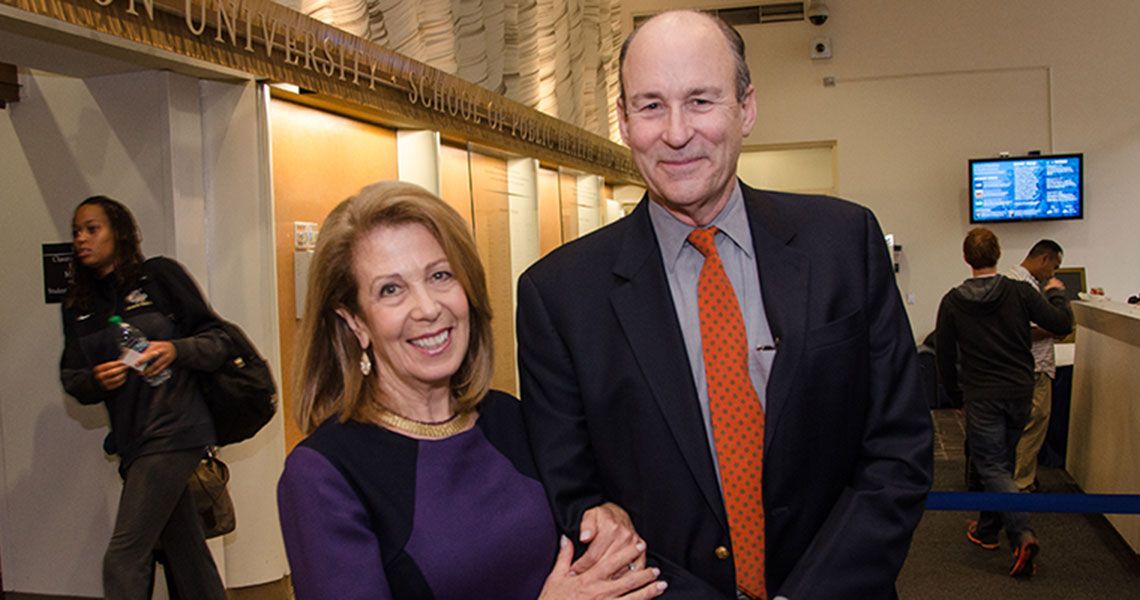Tracy Kidder describes physician and anthropologist Paul Farmer, M.D., Ph.D., as a challenging person, the kind of person whose example can make you feel as though you’ve never done anything as important. “Yet, in his presence,” he explains, “those feelings vanished. In the past, when I’d imagined a person with credentials like his, I’d imagined someone dour and self-righteous, but he was very friendly and irreverent, and quite funny. He seemed like someone I’d like to know, and I thought that if I did my job well, a reader would feel that way, too.”
Kidder, a Pulitzer Prize winner and best-selling author, addressed the art of the doctor-patient relationship in his biographical work, “Mountains Beyond Mountains,” at the 9th Annual Stuart M. Fidler Memorial Lecture hosted by the GW School of Medicine and Health Sciences (SMHS), Sept. 29.
Matthew Mintz, M.D. ’94, RESD ’97, interim assisant dean for M.D. program curriculum, associate professor of medicine, and director of the primary care clerkship at SMHS, welcomed students, staff, faculty, and alumni to the endowed lecture.
Created in 2005 by Fidler’s family and friends, the lecture honors his career in medicine and celebrates his contributions to the teaching efforts of the SMHS Department of Medicine, where he joined the faculty as clinical professor of medicine in 1973. Fidler also practiced internal medicine and endocrinology in downtown Washington, D.C., for 30 years. The annual lecture focuses on the humanistic aspects of medical care.
“Fidler was a superb physician,” says friend and former colleague of Fidler, Robert Wilkinson, M.D., MACP, Professor Emeritus of Clinical Medicine at SMHS. “He was knowledgeable, conscientious, and compassionate.” A good physician knows his patient, explains Wilkinson, adding that Fidler was a model for what the doctor/patient relationship should be. “He listened carefully and attentively to his patients; he made an effort to thoroughly explain diagnoses; and he always returned a patient’s phone call.”
“Stuart was an excellent physician,” says Fidler’s widow, Jane, addressing the audience. “He understood the science behind medicine.” But knowing that wasn’t sufficient to distinguish him as an excellent physician, explains Jane. “What distinguished Stuart as an excellent physician was the relationship he forged with every patient that walked through his door,” she adds. “Stuart felt that it was an honor to practice,” says Jane. She encouraged the next generation of physicians, “to find that inner spark of notability that makes you want to be the type of physician that you aspire to be; and learn all you can about the science of medicine and the art of caring for your patients.”
Over the summer, the first-year SMHS medical students read Kidder’s book about Farmer, who established clinics and hospitals throughout Haiti to address the increasing incidence of HIV and tuberculosis.
Kidder tailored his talk to the humanistic side of medicine and how Farmer’s humanitarian efforts to help the medically underserved exemplifies compassion and dignity.
Farmer rose from his humble beginnings growing up in Florida to Harvard University where he trained in medicine. Kidder recounted the numerous times he and Farmer traveled to far off places such as Haiti, Peru, Paris, and Russia to secure health care for the poor.
“I tried to make those places of extreme suffering from hunger and illness vivid because it was in those settings that Farmer’s extreme passion to alleviate suffering made perfect sense to me,” explains Kidder.
At age 27 Farmer co-founded Partners In Health (PIH), an international social justice and health organization, which began in Cange in the Central Plateau of Haiti, explains Kidder. Today, PIH has grown into a worldwide health organization with a model for providing health care to the world’s impoverished regions.
“What I admire most about Farmer and his team is their willing to tackle problems that no one else will,” says Kidder. “Farmer and his organization combine competence and even brilliance to an extraordinary degree; and show us that a small group of people, not one person, can in fact improve the world.”
In closing, Kidder summed up his experiences with Farmer saying, “In my travels with Farmer, he showed me more reasons for despair than I have ever seen before or indeed imagined; yet it most was most exhilarating experience of my life,” he says. “Double-edge exhilaration because it illuminated very clearly the huge gap between what can be done and what is being done.”



